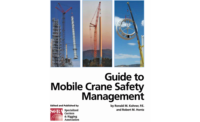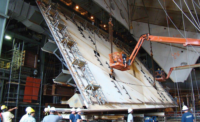Lifting Experts Teach Online Course for Rigging Engineers

When John Glinski heard about a new online course for rigging engineering, he knew he had to sign up.
"I wanted to increase my knowledge," says the 56-year-old Fluor Corp. employee and safety manager of cranes and rigging for Tappan Zee Constructors. "I wanted to know the engineering behind everything because it makes you a better rigger."
Rigging engineering is not yet a recognized profession, but Glinski and many others in the construction industry work every day as rigging engineers. Not purely riggers or engineers, they regularly blend theories of civil, structural and mechanical engineering with the practical application of planning lifts, calculating mass and moving loads. All the while, they hold the heavy responsibility of keeping workers and the surrounding public out of danger.
"It's high-risk activity," says J. Keith Anderson, who is the chief rigging engineer of Bechtel Corp. and author of "Rigging Engineering Basics," a 434-page book published last year that serves as a companion to the online course. The book's publisher, Industrial Training International, introduced the online course in January. There are about 40 students enrolled to date.
Prospective students include "young, educated engineers who want to learn something of the rigging discipline," says Anderson. "They could also be people doing a sterling job in the craft who want to get some of the theory," he adds.
The course includes classes on connections, stresses, hydraulics, lift design, cranes, derricks, strand jacks and load control. Classes are prerecorded and presented on demand over the Web, so students can go at their own pace.
"It's great that the technology allows us to do this kind of thing," says Anderson, one of 20 instructors comprising a who's who of the lifting, rigging and heavy-haul worlds. "They are all well- respected in their own disciplines," Anderson says.
The first class is a review of high-school trigonometry, in which students learn how to calculate sling angles and other equations needed to apply basic rigging techniques. More advanced classes get into specialized topics, such as off-level pick points and vessel upending.







